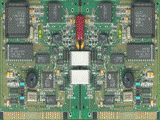Electrical and Computer Engineering, Department of

Department of Electrical and Computer Engineering: Faculty Publications (to 2015)
Document Type
Article
Date of this Version
9-2012
Citation
IEEE TRANSACTIONS ON PARALLEL AND DISTRIBUTED SYSTEMS, VOL. 23, NO. 9, SEPTEMBER 2012; Digital Object Identifier no. 10.1109/TPDS.2012.53
Abstract
In this paper, we investigate the scalability of three communication architectures for advanced metering infrastructure (AMI) in smart grid. AMI in smart grid is a typical cyber-physical system (CPS) example, in which large amount of data from hundreds of thousands of smart meters are collected and processed through an AMI communication infrastructure. Scalability is one of the most important issues for the AMI deployment in smart grid. In this study, we introduce a new performance metric, accumulated bandwidth distance product (ABDP), to represent the total communication resource usages. For each distributed communication architecture, we formulate an optimization problem and obtain the solutions for minimizing the total cost of the system that considers both the ABDP and the deployment cost of the meter data management system (MDMS). The simulation results indicate the significant benefits of the distributed communication architectures over the traditional centralized one. More importantly, we analyze the scalability of the total cost of the communication system (including MDMS) with regard to the traffic load on the smart meters for both the centralized and the distributed communication architectures. Through the closed form expressions obtained in our analysis, we demonstrate that the total cost for the centralized architecture scales linearly as O(λN), with N being the number of smart meters, and λ being the average traffic rate on a smart meter. In contrast, the total cost for the fully distributed communication architecture is O(λ⅔N⅔), which is significantly lower.


Comments
Copyright 2012 IEEE